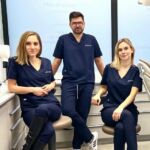When to come with your child for the first visit? What is an adaptation visit? How can I, as a parent, help my child enjoy visiting the dentist?
When is the first time to visit the dentist with the child?
Probably many parents wonder when to visit a dentist’s office for the first time? If this question arose in your mind, it means that both you and your child are ready to get to know the dentist. At the outset, it is worth noting that the first visit is best when the child does not have milk teeth yet. It may shock you, but it is the best time to learn proper oral hygiene, consult your doctor about your doubts related to the future eruption of milk teeth and, most importantly, to familiarize your child with the presence at the dentist’s office. If the child already has deciduous or even permanent dentition and has never visited a dentist, you should also make an appointment to check the condition of the oral cavity.
First visit – what should it look like?
Your child’s first visit to the dentist is very important. It must be accompanied by positive emotions, which is why it is often not combined with therapeutic intervention. It is the so-called adaptation visit, during which the child will get used to the new place. The little patient gets to know a new environment, and our goal is to have positive associations with it. Many new interesting stimuli are waiting for him in the office. Starting from the waiting room with a corner where the child can calm down, through the dentist’s office where the little patient is invited to the chair and the tools are presented in an accessible way, so that they do not cause unnecessary fear. During such a simulation of the visit, the patient may find out that the chair is very comfortable and that the Doctor is a new friend who additionally answers all bothering questions. At the end of the visit, the child receives a small gift, which additionally helps the patient to preserve positive memories of the visit.
An additional benefit is that the doctor familiarizes himself with the health of the child’s oral cavity. During such a visit, the dentist wastes no time and cleverly uses every opportunity when a child opens his mouth to carefully examine its condition. Thanks to this, you can plan further treatment and receive a set of recommendations for home oral hygiene.
It should be remembered that an adaptation visit is not a necessary element for a toddler to like the dentist. Some young patients feel very comfortable in the dentist’s chair from the very beginning and quickly begin to trust their doctor. Thanks to this, it is possible to start any therapy during the first visit. Each child is different and we are often unable to predict his reaction, so it is so important to show up for the appointment before anything worries us.
What if we missed the adaptation visit and the child shows up at the dentist’s for the first time with pain or caries?
Regardless of the reason for which you come with your child, you should make sure that they have pleasant memories of the visit. So what can you do as a parent to help your child?
Try to stay cool. Little patients perfectly read our emotions, so it is worth taking care of the right atmosphere at the beginning. If you feel anxious about the visit yourself, first try to calm your own emotions so that the little patient will feel more confident.
Let the doctor contact your baby. It is extremely important for the little patient to trust him, thanks to which he will be able to feel safe in the dentist’s chair.
Try to avoid messages that suggest negative emotions, such as “don’t be afraid, nothing will hurt” as they can paradoxically backfire. Instead, we encourage you to focus on positive feelings. You can say: “The doctor came to help you”, “you are very polite and I am very proud of you”.
Build your child’s trust by providing accessible information about the course of the planned visit. You should be aware that little patients perceive the world from a slightly different perspective. Avoid the “nothing will be done” message as it can result in a loss of confidence in both the parent and the dentist. Even if, in our opinion, this is true, because the doctor will not conduct the treatment, for the child the mere presence in the dentist’s chair may be perceived as an intervention. A much better solution is to inform the child: “the doctor will touch a tooth”, “the doctor will count the teeth”.
What can we do as a parent at home so that the child is not afraid of the dentist?
First of all, we can talk a lot with the child about past or future visits, a pleasant atmosphere, interesting things or situations that happened in the office. It is worth explaining that doctors are there to help not only children, but also adults. You can do it both during your daily hygiene activities and by walking past your dentist’s website. Educational books that mention the dentist theme can also be helpful (you can find both of them in most bookstore and in our children’s corner). We should remember that if the visit is associated with something nice and interesting, both in our memories and in our stories, our child will not be afraid of the dentist!

